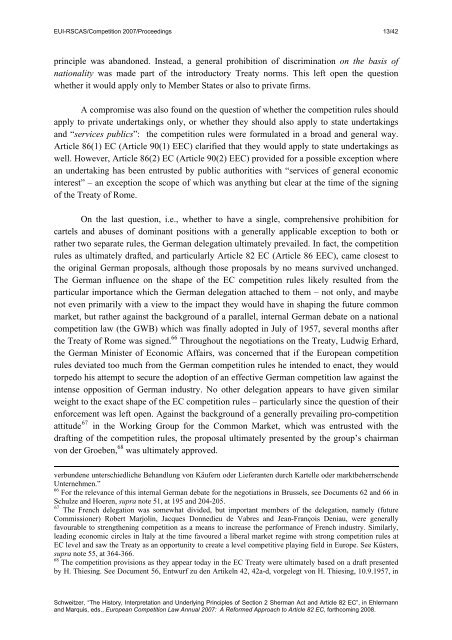The History, Interpretation and Underlying Principles of Section
The History, Interpretation and Underlying Principles of Section
The History, Interpretation and Underlying Principles of Section
You also want an ePaper? Increase the reach of your titles
YUMPU automatically turns print PDFs into web optimized ePapers that Google loves.
EUI-RSCAS/Competition 2007/Proceedings 13/42<br />
principle was ab<strong>and</strong>oned. Instead, a general prohibition <strong>of</strong> discrimination on the basis <strong>of</strong><br />
nationality was made part <strong>of</strong> the introductory Treaty norms. This left open the question<br />
whether it would apply only to Member States or also to private firms.<br />
A compromise was also found on the question <strong>of</strong> whether the competition rules should<br />
apply to private undertakings only, or whether they should also apply to state undertakings<br />
<strong>and</strong> “services publics”: the competition rules were formulated in a broad <strong>and</strong> general way.<br />
Article 86(1) EC (Article 90(1) EEC) clarified that they would apply to state undertakings as<br />
well. However, Article 86(2) EC (Article 90(2) EEC) provided for a possible exception where<br />
an undertaking has been entrusted by public authorities with “services <strong>of</strong> general economic<br />
interest” – an exception the scope <strong>of</strong> which was anything but clear at the time <strong>of</strong> the signing<br />
<strong>of</strong> the Treaty <strong>of</strong> Rome.<br />
On the last question, i.e., whether to have a single, comprehensive prohibition for<br />
cartels <strong>and</strong> abuses <strong>of</strong> dominant positions with a generally applicable exception to both or<br />
rather two separate rules, the German delegation ultimately prevailed. In fact, the competition<br />
rules as ultimately drafted, <strong>and</strong> particularly Article 82 EC (Article 86 EEC), came closest to<br />
the original German proposals, although those proposals by no means survived unchanged.<br />
<strong>The</strong> German influence on the shape <strong>of</strong> the EC competition rules likely resulted from the<br />
particular importance which the German delegation attached to them – not only, <strong>and</strong> maybe<br />
not even primarily with a view to the impact they would have in shaping the future common<br />
market, but rather against the background <strong>of</strong> a parallel, internal German debate on a national<br />
competition law (the GWB) which was finally adopted in July <strong>of</strong> 1957, several months after<br />
the Treaty <strong>of</strong> Rome was signed. 66 Throughout the negotiations on the Treaty, Ludwig Erhard,<br />
the German Minister <strong>of</strong> Economic Affairs, was concerned that if the European competition<br />
rules deviated too much from the German competition rules he intended to enact, they would<br />
torpedo his attempt to secure the adoption <strong>of</strong> an effective German competition law against the<br />
intense opposition <strong>of</strong> German industry. No other delegation appears to have given similar<br />
weight to the exact shape <strong>of</strong> the EC competition rules – particularly since the question <strong>of</strong> their<br />
enforcement was left open. Against the background <strong>of</strong> a generally prevailing pro-competition<br />
attitude 67 in the Working Group for the Common Market, which was entrusted with the<br />
drafting <strong>of</strong> the competition rules, the proposal ultimately presented by the group’s chairman<br />
von der Groeben, 68 was ultimately approved.<br />
verbundene unterschiedliche Beh<strong>and</strong>lung von Käufern oder Lieferanten durch Kartelle oder marktbeherrschende<br />
Unternehmen.”<br />
66 For the relevance <strong>of</strong> this internal German debate for the negotiations in Brussels, see Documents 62 <strong>and</strong> 66 in<br />
Schulze <strong>and</strong> Hoeren, supra note 51, at 195 <strong>and</strong> 204-205.<br />
67 <strong>The</strong> French delegation was somewhat divided, but important members <strong>of</strong> the delegation, namely (future<br />
Commissioner) Robert Marjolin, Jacques Donnedieu de Vabres <strong>and</strong> Jean-François Deniau, were generally<br />
favourable to strengthening competition as a means to increase the performance <strong>of</strong> French industry. Similarly,<br />
leading economic circles in Italy at the time favoured a liberal market regime with strong competition rules at<br />
EC level <strong>and</strong> saw the Treaty as an opportunity to create a level competitive playing field in Europe. See Küsters,<br />
supra note 55, at 364-366.<br />
68 <strong>The</strong> competition provisions as they appear today in the EC Treaty were ultimately based on a draft presented<br />
by H. Thiesing. See Document 56, Entwurf zu den Artikeln 42, 42a-d, vorgelegt von H. Thiesing, 10.9.1957, in<br />
Schweitzer, “<strong>The</strong> <strong>History</strong>, <strong>Interpretation</strong> <strong>and</strong> <strong>Underlying</strong> <strong>Principles</strong> <strong>of</strong> <strong>Section</strong> 2 Sherman Act <strong>and</strong> Article 82 EC”, in Ehlermann<br />
<strong>and</strong> Marquis, eds., European Competition Law Annual 2007: A Reformed Approach to Article 82 EC, forthcoming 2008.

















